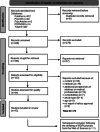Working towards a new normal: a meta-synthesis of patient-reported aspects of a good life with heart disease
- PMID: 40462145
- PMCID: PMC12135301
- DOI: 10.1186/s12955-025-02388-6
Working towards a new normal: a meta-synthesis of patient-reported aspects of a good life with heart disease
Abstract
Aims: This meta-synthesis challenges the medical notion of health-related quality of life (HRQOL) by identifying aspects of the more holistic philosophical concept of the good life from the perspective of patients with heart disease.
Design: Systematic meta-synthesis.
Methods: Following preregistration on PROSPERO, a systematic literature search was conducted in PubMed, PsycInfo, PsycArticles, and PSYNDEX from February 2023 to March 2024. Studies focusing on the experiences of adults living with heart disease were included based on predefined criteria. Articles were assessed for methodological quality using a modified CASP tool, and data synthesis followed Interpretative Phenomenological Analysis. Reporting adheres to PRISMA and ENTREQ guidelines.
Results: Forty-three articles were included, revealing the overarching theme of "Working towards a new normal," with four sub-themes: (1) Feeling safe in my own body again, (2) Important relationships provide security and meaning, (3) Taking my life into my own hands again and (4) Living more consciously.
Conclusions: While HRQOL is a valuable and widely used concept, it primarily captures quality of life from a functional perspective. Qualitative studies on individuals with heart disease reveal the additional aspects of coherence, connectedness, and self-determination that align more closely with the concept of a good life.
Implications: To enhance care and counseling for patients with heart disease, the concept of HRQOL should be broadened to incorporate preferences, interests, and needs regarding life planning, aligned with the notion of a good life.
Keywords: Heart disease; Interpretative phenomenological analysis; Meta-synthesis; Normalcy; Quality of life; The good life.
© 2025. The Author(s).
Conflict of interest statement
Declarations. Ethics approval and consent to participate: Not applicable. Consent for publication: Not applicable. Competing interests: C.H.L. has received personal royalties for the German version of the Hospital Anxiety and Depression Scale from the publisher Hogrefe-Huber, personal lecture fees from Novartis as well as from sponsors of non-industry-dependent training events and institutional research funding from the BMBF, DFG and EU Commission over the past three years. The other authors declare no potential conflicts of interest with respect to the research, authorship, and publication of this article.
Figures
References
-
- WHOQOL Group. The World Health Organization Quality of Life Assessment (WHOQOL): position paper from the world health organization. Soc Sci Med. 1995;41(10):1403–9. 10.1016/0277-9536(95)00112-k. - PubMed
-
- Ryff CD. Happiness is everything, or is it? Explorations on the meaning of psychological well-being. J Pers Soc Psychol. 1989;57(6):1069–81. 0022-3514/89/SOO.75.
-
- Bishop M. The Good Life: Unifying the Philosophy and Psychology of Well-Being. New York: Oxford University Press; 2014.
-
- Besser-Jones L. Eudaimonism. In: Fletcher G, editor. The Routledge Handbook of Philosophy of Well-Being. New York: Routledge; 2016. p. 187–96.
-
- Gregory A. Hedonism. In: Fletcher G, editor. The Routledge Handbook of Philosophy of Well-Being. New York: Routledge; 2016. p. 113–23.
Publication types
MeSH terms
Grants and funding
LinkOut - more resources
Full Text Sources
Medical


